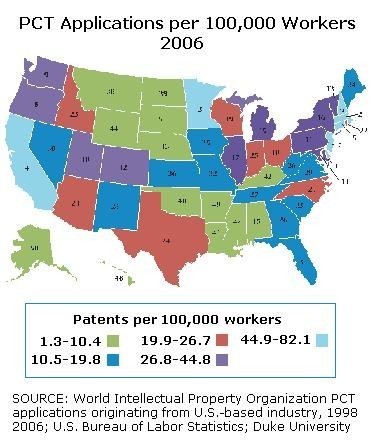KANSAS CITY, Mo. – Massachusetts and Connecticut are among the top states for innovation leadership, based on international patent-application filings per worker, according to an intellectual property creation report released today by the Ewing Marion Kauffman Foundation.
Delaware, home of DuPont & Co., was No. 1 nationwide in percentage of applications filed per 100,000 workersunder the 1970 Patent Cooperation Treaty, with 82.1 PCT applications per 100,000 workers in 2006. It was followed by Massachusetts, with 79.0, up from 37.8 in 1998; Minnesota, home of 3M Innovative Properties Co., with 69.5; California, with 58.5; and Connecticut, with 57.4. Rhode Island was No. 22 in 2006, with 25.0 filings per 100,000 workers, up from 14.6 in 1998.
PCT filings per capita were lowest in No. 51 South Dakota, followed by Alaska, Arkansas, Hawaii and Mississippi, the analysis found. (The list included the District of Columbia, which ranked 45th.)
The foundation said it selected PCT filings as a marker because such applications – offering a means for inventors to safeguard their intellectual property in more than 100 countries with a single application – require a higher level of sophistication and a more costly and time-consuming application process than those submitted only to the U.S. Patent and Trademark Office.
“Given the importance of global intellectual property protection to continued innovation and growth in the United States, an inquiry into trends in U.S. PCT applications offers a unique lens on technological change in this country and on the country’s role in global intellectual property creation,” Robert Litan, the foundation’s vice president of research and policy, said in a statement today.
The Kauffman Foundation study was based on filings in 1998 and 2006. Over that nine-year period, although applications for international patents increased significantly nationwide, “this growth does not appear to have occurred throughout the country,” the analysis found. In 1998, the number of PCT applications filed per 100,000 workers in each state ranged from 1.3 to 55.6, and the nationwide average was 14.9. In 2006, the states’ scores ranged from 1.3 to 82.1, while the nationwide average had risen to 25.1.
Industry accounted for the vast majority of U.S. PCT applications: 92.2 percent in 2006, up from 91.1 percent in 1998. California accounted for nearly a quarter of such filings, followed by New York, Massachusetts, Texas and New Jersey.
Universities and research institutions accounted for 7.8 percent of U.S. PCT applications in 2006, down from 8.9 percent in 1998. The states with the greatest number of such applications were California, Massachusetts, New York, Texas and Florida. The University of California system contributed more international patent filings than any of the other 24 universities listed, followed by the Massachusetts Institute of Technology and Columbia University.
The U.S. share of PCT applications remained greater than that of any country, but the nation’s share of total applications worldwide fell from 37.4 percent in 1998 to 34.1 percent in 2006 as applications increased faster in other countries than here.
“In a global economy in which growth is driven by innovation, global patent applications are just one of many important measures of progress and potential,” said the study’s lead researcher, Vivek Wadhwa, a fellow with Harvard Law School and executive-in-residence at Duke University. “States competing for economic and productivity growth in today’s economy will focus not only on fostering the innovation that directly precedes patent filings, but also on building the knowledge base of their citizenry and the infrastructure that will support development of entrepreneurial businesses.”
The Ewing Marion Kauffman Foundation of Kansas City, Mo., is a private, nonpartisan foundation established in the mid-1960s to improve education and advance entrepreneurship in America. Additional information about the foundation and the new report, “U.S.-Based Global Intellectual Property Creation,” can be found at www.kauffman.org.
No posts to display
Sign in
Welcome! Log into your account
Forgot your password? Get help
Privacy Policy
Password recovery
Recover your password
A password will be e-mailed to you.











